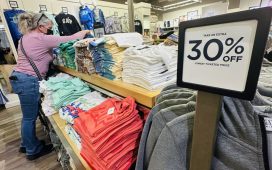Shoppers are expected to snap up fewer items during the Black Friday sales, which reach their peak this weekend, as the cost of living crisis and strikes at some Amazon warehouses dent trading.
British consumers are expected to spend slightly more this year than in 2022, but data indicates they will buy fewer goods when the impact of inflation is stripped out.
Almost £8.7bn is expected to be spent between Friday morning and Monday night, according to analysis by GlobalData for Vouchercodes. That’s just 0.4% up on last year, compared with inflation of 3.4% in non-food items in October, according to the British Retail Consortium trade body.
Retailers have been running discounts for weeks as the warm start to the autumn left some with high stocks of clothing and footwear while households have been cautious about spending on non-essentials amid high food and energy bills.
Unlike in previous years, when shoppers have been pictured battling for bargain TVs and other expensive homewares on Black Friday, this time spending is expected to be focused on discounted Christmas presents.
Spending in the run-up to Black Friday has been muted with online retailing body IMRG recording a 6.2% drop in sales in the second week of November after a 0.5% rise in the first week. It is predicting Black Friday spending online will be down 2%, led by a drop in sales of ready-packaged gifts and clothing.
Last year Amazon accounted for more than 9% of Black Friday spending in the UK, well ahead of second place John Lewis on 4.8%, according to Kantar, an industry analyst.
However, the online retail company, founded by Jeff Bezos, could face disruption from a day of action at its huge Coventry warehouse by workers campaigning for better pay and conditions. The Coventry strike will form part of an international day of action, Make Amazon Pay, with strikes or protests in more than 30 countries to calling for better conditions inside the company’s vast warehouses.
The gloomy outlook comes after a 2.7% year-on-year fall in total retail sales last month, according to the Office for National Statistics (ONS). Sales of clothing and household goods have been hit hardest.
Physical stores have fared better than internet retail, amid rising concerns over online scams, increasing delivery costs and scepticism around the level of bargains on offer. Consumers also have greater confidence about visiting busy shopping areas as fears over catching Covid subside.
The number of shoppers visiting high streets, shopping centres and retail parks is expected to be up by as much as 2%, according to Diane Wehrle at the advisory firm Rendle Intelligence and Insights – although that is still about 10% below pre-Covid levels.
She said that was partly because “the less money you have the more you want to make a considered decision”.
Wehrle said retail locations had now recovered from the drop in visitor numbers during the pandemic and the situation was unlikely to improve further. “The gap between now and pre-Covid is largely driven by hybrid working. Many of us are in town centres and shopping centres less often.”
However, retailers are hoping that the muted run-up to Black Friday is a mark of shoppers holding out for bargains this weekend. Younger shoppers are also notably more enthusiastic about the event, with social media likely to play a bigger role than ever in persuading people to snap up trending items such as electrically heated hoodies.
Marc Pettican, the head of Barclaycard Payments, the debit and credit card operator, said that last year’s discount event was affected by the football World Cup, with spending curtailed in the UK by an England match on Black Friday itself. Fears about impending Royal Mail strikes, which affected home deliveries across the UK, also led to lacklustre online sales in 2022.
Pettican said: “Spending growth continues to lag behind inflation, as value-seeking consumers hunt for bargains. This could either be a sign that cost of living pressures will make cautious consumers reluctant to part with their cash, or could signify that shoppers have been holding out for discounts, boosting the demand for deals. Naturally retailers will be hopeful for the latter.”








